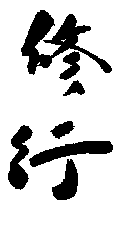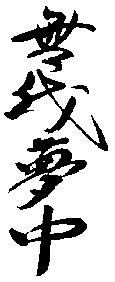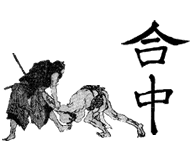History of Aiuchi Jiu Jitsu
The Aiuchi Jiu Jitsu Association was formally created in 1995 with the merger of two Associations which held broadly the same aims: to serve their members, and to develop their skill in jiu jitsu. They also had the goal of providing all the support that clubs require, like grading events, courses and insurance, at a minimal cost. It is still important to Aiuchi to ensure that its members are treated with respect, to build a confident and friendly environment in which to train.
The collective goal of the Aiuchi Jiu Jitsu Association fosters the ideals of learning jiu jitsu by testing, experimenting, and adapting techniques in order to improve and perfect them. It maintains the goals of developing character through the perfection of technique, and training with a partner as a way of gaining insight and compassion.
About The Class
Tom Hill has been studying Aiuchi Jiu Jitsu since 2002 at the Cardiff Jitsu Club. He is fortunate enough to be taught by senior Instructors Mark Williams and Rod Munn. Tom has been an instructor at Cardiff since 2006; he was awarded his Nidan (or second degree black-belt) in 2015. Tom moved to Newport in 2013.
Tom Hill is a recognised instructor of Aiuchi Jiu Jitsu. Aiuchi Jiu Jitsu, encourages people to make the most of their physical and mental attributes because everyone has different characteristics and abilities. There is always someone bigger, stronger, faster, fitter than us, but Aiuchi encourages each individual to make the most of their strengths and overcome their weaknesses.
Glossary
Some japanese you might hear in the dojo.
Words
- sensei
- instructor
- yamae
- stop
- hadjemi
- begin/start
- yeoi
- fighting/ready stance
- rei
- bow
Philosophy
Jiu jitsu is based on the idea of 'jiu'or 'ju' - adaptability, flexibility and gentleness, which encompasses the essence of the art and defines the approach to training and to life. It is not a system of self defence, but an approach to life. Although it may help you to defend yourself, that is only a small part of the art as a whole, and one that many see as being the least important. Being good at defending yourself does not necessarily equate to being good at jiu jitsu. Achieving a level of fitness to practice jiu jitsu will come as a consequence of training regularly. Your body will adapt and develop in the way it needs to in order to perform the techniques. You do not need to train excessively in order to develop your body to give you advantages in defending yourself. Equally, the development of your understanding of the art is a natural progression that will happen with time, through regular contact with the art and its practitioners. With both of these areas, physical and mental, the stress is on natural development, which will be different for each of us within each aspect of the art. It is often the case that those who are initially quick to learn the physical skills are slower to gain a deeper understanding of the art, and vice versa. A student should neither be put off if they feel they are developing more slowly than others in any area, nor feel complacent if they have learnt a particular aspect more quickly.
Ego
Jiu jitsu is not a competitive sport, the only person you compete against is yourself. You strive to improve your skill and understanding and improve the way in which you approach training. You should take pride in your achievements, but never feel superior to others. There is a wide variety of skills in jiu jitsu which take a lifetime to perfect. Everyone has weak points in their repertoire, and it is unlikely that any one person will be the best at everything. Attitude is an important element of any martial art, but is often the one area that people overlook in favour of physical skills. People often confuse confidence with arrogance. Confidence is the belief in your ability to do something, whereas arrogance is the belief that you are superior to others. It is usually the case that confident people do not feel the need to boast about their abilities, whereas arrogant people are often trying to hide their own lack of self-confidence by putting others down and proclaiming their own self worth. When someone says 'I'm the best' they are really saying 'Don't you think I'm the best?'. If you truly believe in yourself you don't need to ask the question.
Traditional/Modern
Our style has retained sufficient tradition to remind members of the roots of jiu jitsu. We line up and greet each other in a traditional manner, but this reflects equality, not hierarchy. However, observance of tradition is limited to ensure there is no hindrance to the development of the style and to keep it relevant to life in today's society. Where defences from, and uses of, traditional weapons are taught emphasis will always be placed on their application to a modern setting. To remain a modern interpretation of traditional techniques the art will need to change and to be re-interpreted. It is organic in nature, and even the best instructor cannot pass on all the skills and techniques learnt without some loss. That is why it is important to train with more than one instructor, and always to apply a critical eye to what you are taught, no matter what their level. Some techniques may be changed or forgotten and will need to be re-introduced and modified with time.
Training
The purpose of training is to acquire and perfect the techniques and principles of jiu jitsu, and to gain control over ones own body, mind and spirit. There is no single way to do this, but a good instructor will provide a variety of ways of training within their dojo over time. The atmosphere may sometimes be serious, at other times light hearted, sometimes intense, physically demanding, or relaxed as required. It is important that jiu jitsuka train in a variety of atmospheres so that they learn to adapt their training appropriately. People will respond in different ways to different methods of practice. Ideally instructors should respond to the atmosphere in a club and vary the training according to the mood. This doesn't mean that a lethargic club needs relaxed training. Often the opposite is required, but an instructor should gauge the mood and ability of their students in order to teach techniques in the most appropriate way. A student should feel free to train in any club within our organisation, or indeed other styles and other arts. They should question and interpret what they are taught and make it their own, but beware of thinking that all the techniques and principles employed in other styles can be applied to our art, for some do not combine well with Aiuchi Jiu jitsu. One important principle is that people learn better and quicker if they are relaxed. It is important that when showing someone a new technique they should learn it in an environment that is relaxed. Not only will they learn it more quickly, but they are also more likely to avoid injury. There is time enough later to make the training harder, faster and more demanding.
Serious Fun For All
To ensure safety an element of discipline and control is needed in the dojo. Acceptance of this should not be demanded, but rather should be 'given' by students in acknowledgement of the particular nature of the environment they have chosen to be involved with. However, instructors do not have the right to abuse this relationship, and a level of common sense and common understanding is required. Equally instructors cannot demand or expect to be given respect, but should strive to earn it through their words and actions. Our philosophy is that respect must be a two way thing between instructors and students, and must be freely given by both if it is to have any value . In the world of martial arts fear can often be mistaken for respect, and this is not acceptable to this Association. We believe that training should be enjoyable and that this can be achieved while still acknowledging and respecting the serious nature of the art. Aiuchi Jiu jitsu should also be available to all people, regardless of size, age, gender, race or creed, or to varying levels of fitness or physical ability. Our teaching methods and grading systems will be flexible enough to reflect this, and yet maintain high standards by demanding the best that each individual has to offer at their level of achievement and understanding.
Application on the street
Aiuchi Jiu jitsu should only ever be used in self defence, or defence of others, in situations where there is a real physical threat. A member must never start a confrontation in order to test skills or techniques, or use his or her abilities in order to force others to act against their will. The philosophy of Aiuchi Jiu jitsu is that in most situations physical conflict can be avoided, and that to fight is to lose, regardless of the outcome.
Teaching and Learning
Aiuchi Jiu jitsu instructors should be seen to reflect the value of the organisation's philosophies and to pass these on through good example. Teachers are those who have been fortunate enough to develop to that level of understanding, but in reaching this stage should also have developed the humility to recognise that the student is equally important, and that their position as an instructor is not an indication of value or status. Instructors are still students themselves, and should be both willing and able to learn from other instructors (whether they be more experienced, peers or less experienced), and importantly instructors should also be willing and able to learn from their students. The learning cycle can never be completed.
Other Martial Arts
There are no restrictions on members learning or taking an interest in other martial arts, and this can often lead to a better understanding of the principles of Jiu jitsu. Equally, we welcome practitioners from other arts, so long as they come with a genuine desire to learn our techniques, teaching principles and philosophy. Students from other arts, no matter how experienced, will be expected to learn our syllabus from white belt onwards.
Life
Jiu jitsu should enrich your life. Knowledge of Jiu jitsu may prolong or preserve your life, it should not occupy the whole of your existence. If you spend all day everyday thinking about Jiu jitsu then you have no life. Jiu jitsu should be part of the mix, as with most things it is important to achieve balance.
Psychology
In the Japanese martial arts the training of the mind has always been at least as important as the training of the body - if not more so - and a variety of techniques and methods exist for psychologically conditioning the ju-jitsu trainee. Many modern schools ignore these aspects of jitsu, which is a great pity, because they considerably enhance a person's ability to understand and implement what has been learned.
Meditation is perhaps the best known direct psychological training and its benefits are widely appreciated; many people who have nothing to do with the martial arts also use meditation. The posture adopted for the traditional method of practicing meditation is known as zazen. There are many different drills through which which students are led until they are capable of meditating on their own. One classical drill involves sitting in zazen and imaging oneself on a mountain top. In front of you there is a white handkerchief covered by pebbles. The sensei tells you to empty your mind of everything and every time a thought drifts into your consciousness you should pick up a pebble and throw it away, the thought going with it. This is good training for stilling the mind. Such training greatly improves the ability both to concentrate and to identify needs and objectives more clearly.
These meditation practices, carried to the most extreme degree were at the heart of the samurai warriors' resolute acceptance of death and the code of busido, the way of the warrior.
The way of the warrior is death.
This means choosing death whenever there is a choice between life and death. It means nothing more than this. It means to see things through, being resolved. Sayings like 'To die with your intention unrealised is to dies uselessly' and so on are from the weak Kyoto, Osaka Bushido. they are unresolved as to whether to keep to their original plan when faced with a choice between life and death. Every man wants to live. They theorise with staying alive kept in mind. 'The man who lives on having failed in his intention is a coward' is a heartless definition. That to die having failed is to die uselessly is a mad point of view. This is not a shameful thing, it is the most important in the way of the warrior. If you keep your spirit correct from morning to night, accustomed to the idea of death and resolved on death and consider yourself as a dead body, thus becoming one with the Way of the Warrior, you can pass through life with no possibility of failure and perform your office properly.
This was the essence of the samurai ethos and an integral, indispensable part of the warrior's training for battle. For the modern day jitsu student, who is unlikely to be a soldier it may seem less relevant, but it can help considerably in the winning of the little battles that make up daily life. Meditation helps composure and self-control and alleviates stress-; it can provide a route to the acceptance of death; it also enhances life. One of the reasons for practicing mental control is that an uncluttered mind will quicken your reaction time. When blocking any attack the most salient factor tends to be the speed with which you recognise and respond to the initial attack. At a basic level of competence, reaction to attack is simply a conditioned reflex, but in the higher echelons of the martial arts this is not as desirable as it may seem. The beginner may think that being able to react 'without even thinking' shows the highest level of attainment, however, this is not always advantageous.
If people are trained to react reflexively in a certain way this can very easily be turned to their disadvantage. Do not fix you mind on things as they are not always as they seem, skill in self-defense is not gained by slavish mechanical repetition. Technique has its place, but so too does instinct. The true expert must always be ready to adapt at a fraction of a seconds' notice.
A number of terms exist describing the states of mind to which students of the martial arts aspire and which are considered to be useful and desirable for progress.
 Mu-Shin, or empty mind, is a mental state in which students try to cut off thought and free themselves from distractions. This stopping of the thought processes, when successful, leads to a clear mind uncluttered by irrelevant or distracting ideas. The essence of Mu-Shin is in being ready and able to react without reflection in an emergency. It is essential not to be too tense since this can inhibit movement, nor so relaxed that you become careless, dreamy or sloppy.
Mu-Shin, or empty mind, is a mental state in which students try to cut off thought and free themselves from distractions. This stopping of the thought processes, when successful, leads to a clear mind uncluttered by irrelevant or distracting ideas. The essence of Mu-Shin is in being ready and able to react without reflection in an emergency. It is essential not to be too tense since this can inhibit movement, nor so relaxed that you become careless, dreamy or sloppy.
 Isshin(one heart or mind) and Zanshin (remaining heart or mind) are mental states or attitudes apposite to certain circumstances. Isshin is the spirit of abandonment, of throwing yourself into whatever you are doing with no thought for success or failure. This means attacking with all your spirit, fearless of any counterattack. If the attack is good you will succeed with your intention, if not, its intensity may at least unsettle your opponent. Attacking with this spirit in training - which is akin to risking everything on a single roll of a dice - will eventually bring results.
Isshin(one heart or mind) and Zanshin (remaining heart or mind) are mental states or attitudes apposite to certain circumstances. Isshin is the spirit of abandonment, of throwing yourself into whatever you are doing with no thought for success or failure. This means attacking with all your spirit, fearless of any counterattack. If the attack is good you will succeed with your intention, if not, its intensity may at least unsettle your opponent. Attacking with this spirit in training - which is akin to risking everything on a single roll of a dice - will eventually bring results.
Zanshin means retaining conscious (or unconscious) awareness in the course of an action, not exactly holding back, yet being aware of possible subsequent consequences to the initial attack. It is a wider, more enduring spirit than that of isshin which is focused like a laser beam and discharged. Zanshin is the consciousness both preceding and continuing after the attack.
Another state of mind in ju-jitsu is Fundoshin, or 'immovable mind', and is a state of unshakable determination and is developed through training.
 Mu-ga-mu-cho; The concept of selfless and total immersion in the training process of jitsu.
Mu-ga-mu-cho; The concept of selfless and total immersion in the training process of jitsu.


MAIL
> Contact Us
AIUCHI
> Our Jiu Jitsu Association